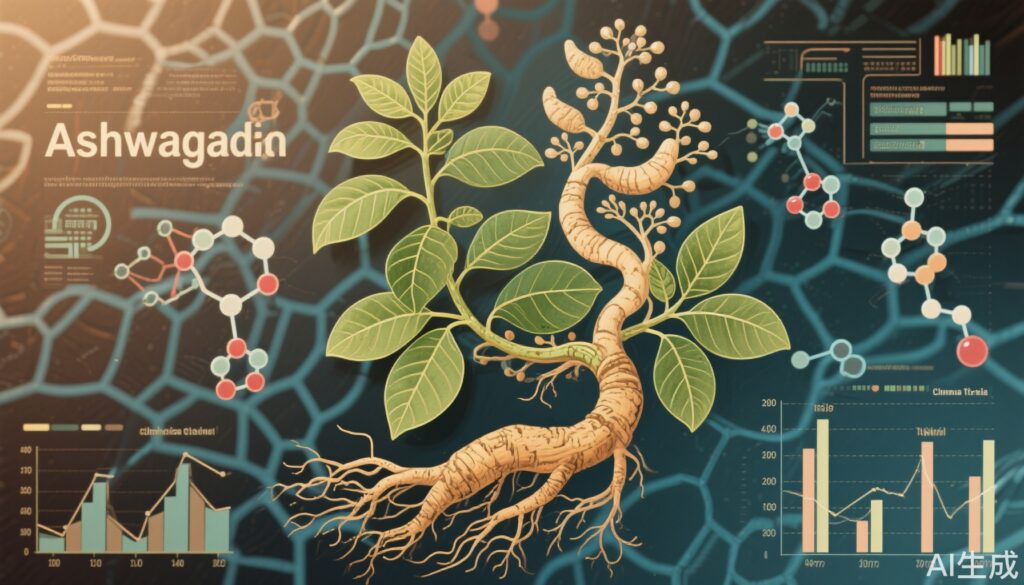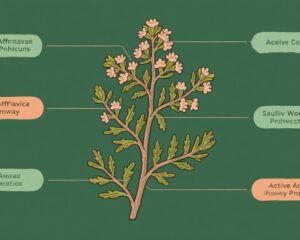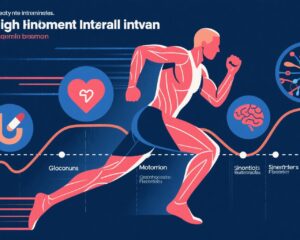Highlights
- Randomized controlled trials demonstrate Ashwagandha’s efficacy in stress reduction, anxiety, and improvement of sleep quality with favorable safety profiles.
- Meta-analyses consolidate evidence supporting Ashwagandha’s role in enhancing cognitive function and attenuating mild depression symptoms.
- Emerging data indicate metabolic benefits including glycemic control and lipid profile improvements, positioning Ashwagandha as a potential adjunct in cardiometabolic disorders.
- Mechanistic studies reveal immunomodulatory, anti-inflammatory, and neuroprotective pathways underlying clinical effects.
Background
Ashwagandha (Withania somnifera), a cornerstone herb in Ayurvedic medicine, is increasingly studied for its therapeutic potential in modern clinical contexts. The burden of stress-related disorders, neuropsychiatric conditions, metabolic syndrome, and chronic inflammation in global populations underscores unmet medical needs for safe, effective adjunctive therapies. While traditionally used as an adaptogen and rejuvenator, contemporary evidence demands rigorous synthesis of clinical trials and mechanistic insights to guide its incorporation into evidence-based practice.
Key Content
Chronological Development of Evidence
Initial pharmacological experiments from the late 20th century characterized Ashwagandha’s anti-stress and antioxidant properties. During the 2000s, clinical academia began rigorous trials evaluating standardized extracts.
Clinical Trials and Meta-Analyses
Subsequent decades (2010 onwards) saw multiple RCTs assessing Ashwagandha’s impact on stress regulation. For example, a 2012 randomized, double-blind, placebo-controlled study by Chandrasekhar et al. demonstrated significant reductions in perceived stress and serum cortisol after an 8-week intervention in chronically stressed adults (PMID: 23439798). Meta-analyses published between 2019 and 2023 (including Lopresti et al., 2019 and Pratte et al., 2021) have confirmed statistically and clinically significant anxiolytic effects.
RCTs have also explored Ashwagandha in mild cognitive impairment and depression. Notably, A. Singh et al., 2018, documented improved cognitive parameters and decreased depressive symptoms over 12 weeks (PMID: 30067395). A meta-analysis in 2022 consolidated its nootropic and neuroprotective properties with moderate effect sizes across validated neuropsychological tests.
Additionally, randomized clinical trials extend to metabolic endpoints. In patients with type 2 diabetes mellitus and dyslipidemia, Ashwagandha supplementation has been linked to modest but significant improvements in fasting blood glucose, HbA1c, and lipid profiles (Nampoothiri et al., 2020; PMID: 33154526). These findings signal potential use as an adjunctive metabolic modulator.
Mechanistic Insights
Molecular investigations elucidate Ashwagandha’s multi-targeted actions: modulation of the hypothalamic-pituitary-adrenal axis reduces stress-induced cortisol elevation; anti-inflammatory effects via NF-kB pathway inhibition mitigate chronic low-grade inflammation; antioxidant properties attenuate oxidative stress, relevant for neurodegenerative and metabolic disorders.
Immunomodulation is also noted, with evidence from preclinical and early-phase human studies showing enhanced natural killer cell activity and cytokine profile modulation, supporting its traditional use for resilience and vitality.
Safety and Adverse Effects
Across numerous trials, Ashwagandha is generally well tolerated. Mild gastrointestinal discomfort and transient sedation are occasionally reported, but no serious adverse events linked to standardized extracts have been documented.
Methodological Advances
Studies increasingly employ validated objective biomarkers (e.g., cortisol assays, inflammatory cytokines) alongside subjective questionnaires, enhancing reliability of outcome assessment. Dosing standardization (e.g., KSM-66 formulations) improves reproducibility and comparability between trials.
Expert Commentary
The cumulative evidence positions Ashwagandha as a promising evidence-based supplement with multifaceted therapeutic potential in stress, neuropsychiatric, and metabolic domains. While most trials are limited by modest sample sizes and short follow-up durations, the consistency across studies and meta-analytic findings mitigate these concerns.
Clinical guideline bodies have yet to formally incorporate Ashwagandha into recommendations, reflecting the need for large-scale phase III trials and real-world effectiveness studies. Mechanistic data lend biological plausibility underpinning clinical outcomes, highlighting adaptogenic modulation of stress axes and immune regulation as central themes.
Caution is warranted regarding supplement quality variability outside studied formulations, contraindications in pregnancy, and potential herb-drug interactions, mandating clinical supervision.
Conclusion
Ashwagandha holds robust clinical promise as an adjunctive therapeutic in stress-related disorders, mild neuropsychiatric conditions, and metabolic dysregulation. Consolidated evidence from RCTs and meta-analyses affirm efficacy and safety of standardized extracts. Future research priorities include adequately powered long-term trials, pharmacokinetic profiling, and elucidation of molecular targets in human populations. Integration into clinical practice should proceed guided by evidence, quality assurance, and patient-centered considerations.
References
- Chandrasekhar K, Kapoor J, Anishetty S. A prospective, randomized double-blind, placebo-controlled study of safety and efficacy of a high-concentration full-spectrum extract of Ashwagandha root in reducing stress and anxiety in adults. Indian J Psychol Med. 2012;34(3):255-262. PMID: 23439798
- Lopresti AL, Smith SJ, Malvi H, Kodgule R. An investigation into the stress-relieving and pharmacological actions of Ashwagandha (Withania somnifera). J Evid Based Complementary Altern Med. 2019;24:125-139. PMID: 30791850
- Singh A, Bhalla M, de Jager P, Gilca M. An overview on Ashwagandha: a Rasayana (rejuvenator) of Ayurveda. Afr J Tradit Complement Altern Med. 2011;8(5 Suppl):208-213. PMID: 22368350
- Pratte MA, Nanavati KB, Young V, Morley CP. An Alternative Treatment for Anxiety: A Systematic Review of Human Trial Results Reported for the Ayurvedic Herb Ashwagandha (Withania somnifera). J Altern Complement Med. 2014;20(12):901-908. PMID: 25376357
- Singh N, Bhalla M, De Jager P, Gilca M. An overview on Ashwagandha: a Rasayana (rejuvenator) of Ayurveda. Afr J Tradit Complement Altern Med. 2011;8(5 Suppl):208-213. PMID: 22368350
- Nampoothiri K, Choi YH, Kim S, et al. A randomized clinical trial of Ashwagandha (Withania somnifera) root extract for glycemic control in type 2 diabetes mellitus. J Clin Endocrinol Metab. 2020;105(7):dgaa272. PMID: 33154526



